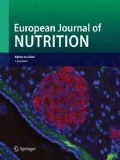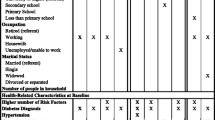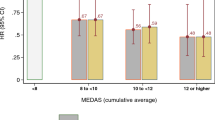Abstract
Background
Determinants of dietary changes obtained with a nutritional intervention promoting the Mediterranean diet have been rarely evaluated.
Aim
To identify predictors of higher success of an intervention aimed to increase adherence to a Mediterranean diet (MeDiet) in individuals at high cardiovascular risk participating in a trial for primary prevention of cardiovascular disease: the PREDIMED (PREvención con DIeta MEDiterránea) trial. Candidate predictors included demographic and socioeconomic characteristics, cardiovascular risk factors, and baseline dietary habits.
Methods
A total of 1,048 asymptomatic subjects aged 55–80 years allocated to the active intervention groups (subjects in the control group were excluded). Participants’ characteristics were assessed at baseline among subjects. Dietary changes were evaluated after 12 months. Main outcome measures were: attained changes in five dietary goals: increases in (1) fruit consumption, (2) vegetable consumption, (3) monounsaturated fatty acid (MUFA)/saturated fatty acid (SFA) ratio, and decreases in (4) sweets and pastries consumption, (5) and meat consumption. Univariate and multivariate logistic regression analyses were used to examine associations between the candidate predictors and likelihood of attaining optimum dietary change (improved adherence to a MeDiet).
Results
Among men, positive changes toward better compliance with the MeDiet were more frequent among non-diabetics, and among those with worse dietary habits at baseline (higher consumption of meat, higher SFA intake, lower consumption of fruit and vegetables). Among women, marital status (married) and worse baseline dietary habits (high in meats, low in fruits and vegetables) were the strongest predictors of success in improving adherence to the MeDiet.
Conclusions
Some participant characteristics (marital status and baseline dietary habits) could contribute to predicting the likelihood of achieving dietary goals in interventions aimed to improve adherence to a MeDiet, and may be useful for promoting individualized long-term dietary changes and improving the effectiveness of dietary counseling.
Similar content being viewed by others
References
Ballesteros-Pomar MD, Rubio-Herrera MA, Gutiérrez-Fuentes JA, Gómez-Gerique JA, Gómez-de-la-Cámara A, Pascual O, Gárate I, Montero R, Campiña S (2000) Dietary habits and cardiovascular risk in the Spanish population: the DRECE study (I). Diet and cardiovascular events risk in Spain. Ann Nutr Metab 44:108–114
Belahsen R, Rguibi M (2006) Population health and Mediterranean diet in southern Mediterranean countries. Public Health Nutr 9:1130–1135
Benetou V, Trichopoulou A, Orfanos P, Naska A, Lagiou P, Boffetta P, Trichopoulos D (2008) Greek EPIC cohort conformity to traditional Mediterranean diet and cancer incidence: the Greek EPIC cohort. Br J Cancer 99:191–195
Beresford SA, Curry SJ, Kristal AR, Lazovich D, Feng Z, Wagner EH (1997) A dietary intervention in primary care practice: the eating patterns study. Am J Public Health 87:610–616
Elosua R, Garcia M, Aguilar A, Molina L, Covas MI, Marrugat J (2000) Validation of the Minnesota leisure time physical activity questionnaire in Spanish women. Investigators of the MARATDON Group. Med Sci Sports Exerc 32:1431–1437
Elosua R, Marrugat J, Molina L, Pons S, Pujol E (1994) Validation of the Minnesota leisure time physical activity questionnaire in Spanish men. The MARATHOM Investigators. Am J Epidemiol 139:1197–1209
Estruch R, Martínez-González MA, Corella D, Salas-Salvadó J, Ruiz-Gutiérrez V, Covas MI, Fiol M, Gómez-Gracia E, López-Sabater MC, Vinyoles E, Arós F, Conde M, Lahoz C, Lapetra J, Sáez G, Ros E (2006) PREDIMED study investigators effects of a Mediterranean-style diet on cardiovascular risk factors: a randomised trial. Ann Intern Med 145:1–11
Giuseppe R, Bonanni A, Olivieri M, Castelnuovo AD, Donati MB, Gaetano G, Cerletti C, Iacoviello L (2008) Adherence to Mediterranean diet and anthropometric and metabolic parameters in an observational study in the ‘Alto Molise’ region: The MOLI-SAL project. Nutr Metab Cardiovasc Dis 18:415–421
Goulet J, Lamarche B, Lemieux S (2007) Factors influencing the dietary response to a nutritional intervention promoting the Mediterranean food pattern in healthy women from the Quebec City metropolitan area. Health Educ Res 22:718–726
Group DPPR (2002) Reduction in the incidence of type 2 diabetes with lifestyle intervention or metformin. N Engl J Med 346:393–403
Howard BV, Van Horn L, Hsia J, Manson JE, Stefanick ML, Wassertheil-Smoller S, Kuller LH, LaCroix AZ, Langer RD, Lasser NL, Lewis CE, Limacher MC, Margolis KL, Mysiw WJ, Ockene JK, Parker LM, Perri MG, Phillips L, Prentice RL, Robbins J, Rossouw JE, Sarto GE, Schatz IJ, Snetselaar LG, Stevens VJ, Tinker LF, Trevisan M, Vitolins MZ, Anderson GL, Assaf AR, Bassford T, Beresford SA, Black HR, Brunner RL, Brzyski RG, Caan B, Chlebowski RT, Gass M, Granek I, Greenland P, Hays J, Heber D, Heiss G, Hendrix SL, Hubbell FA, Johnson KC, Kotchen JM (2006) Low-fat dietary pattern and risk of cardiovascular disease: the women’s health initiative randomised controlled dietary modification trial. JAMA 295:655–666
James PT, Rigby N, Leach R (2004) The obesity epidemic, metabolic syndrome and future prevention strategies. Eur J Cardiovasc Prev Rehabil 11:3–8
Krauss RM, Eckel RH, Howard B, Appel LJ, Daniels SR, Deckelbaum RJ, Erdman JW Jr, Kris-Etherton P, Goldberg IJ, Kotchen TA, Lichtenstein AH, Mitch WE, Mullis R, Robinson K, Wylie-Rosett J, St Jeor S, Suttie J, Tribble DL, Bazzarre TL (2000) AHA dietary guidelines: revision 2000: a statement for healthcare professionals from the Nutrition Committee of the American Heart Association. Stroke 31:2751–2766
Kristal AR, Hedderson MM, Patterson RE, Neuhouser M (2001) Predictors of self-initiated, healthful dietary change. J Am Diet Assoc 101:762–766
Martinez-Gonzalez MA, Sanchez-Villegas A (2004) The emerging role of Mediterranean diets in cardiovascular epidemiology: monounsaturated fats, olive oil, red wine or the whole pattern? Eur J Epidemiol 19:9–13
Martínez-González MA, de la Fuente-Arrillaga C, Nunez-Cordoba JM, Basterra-Gortari FJ, Beunza JJ, Vazquez Z, Benito S, Tortosa A, Bes-Rastrollo M (2008) Adherence to Mediterranean diet and risk of developing diabetes: prospective cohort study. BMJ 336:1348–1351
Martinez-Gonzalez MA, Fernandez-Jarne E, Serrano-Martinez M, Wright M, Gomez-Gracia E (2004) Development of a short dietary intake questionnaire for the quantitative estimation of adherence to a cardioprotective Mediterranean diet. Eur J Clin Nutr 58:1550–1552
Martin-Moreno JM, Boyle P, Gorgojo L, Maisonneuve P, Fernandez-Rodriguez JC, Salvini S, Willett WC (1993) Development and validation of a food frequency questionnaire in Spain. Int J Epidemiol 22:512–519
Mataix J (2003) Tablas de composición de alimentos (Spanish food composition tables), 4th edn. Universidad de Granada, Granada (in Spanish)
Mitrou PN, Kipnis V, Thiébaut AC, Reedy J, Subar AF, Wirfält E, Flood A, Mouw T, Hollenbeck AR, Leitzmann MF, Schatzkin A (2007) Mediterranean dietary pattern and prediction of all-cause mortality in a US population: results from the NIH-AARP diet and health study. Arch Intern Med 167:2461–2468
Moreiras O, Carvajal A, Cabrera L (2005) Tablas de composición de alimentos (Food composition tables), 9th edn. Ediciones Pirámide, Madrid (in Spanish)
Patterson RE, Kristal AR, White E (1996) Do beliefs, knowledge, and perceived norms about diet and cancer predict dietary change? Am J Public Health 86:1394–1400
Popkin BM, Kim S, Rusev ER, Du S, Zizza C (2006) Measuring the full economic costs of diet, physical activity and obesity-related chronic diseases. Obes Rev 7:271–293
Rodrigues SS, Caraher M, Trichopoulou A, de Almeida MD (2008) Portuguese households’ diet quality (adherence to Mediterranean food pattern and compliance with WHO population dietary goals): trends, regional disparities and socioeconomic determinants. Eur J Clin Nutr 11:1263–1272
Salas-Salvadó J, Garcia-Arellano A, Estruch R, Marquez-Sandoval F, Corella D, Fiol M, Gómez-Gracia E, Viñoles E, Arós F, Herrera C, Lahoz C, Lapetra J, Perona JS, Muñoz-Aguado D, Martínez-González MA, Ros E (2008) PREDIMED investigators components of the mediterranean-type food pattern and serum inflammatory markers among patients at high risk for cardiovascular disease. Eur J Clin Nutr 62:651–659
Sanchez-Villegas A, Martinez JA, De Irala J, Martinez-Gonzalez MA (2002) Determinants of the adherence to an “a priori” defined Mediterranean dietary pattern. Eur J Nutr 41:249–257
Serra-Majem L, Roman B, Estruch R (2006) Scientific evidence of interventions using the Mediterranean diet: a systematic review. Nutr Rev 64:S27–S47
Steptoe AP, Perkins-Porras L, Rink E, Hilton S, Cappuccio FP (2004) Phychological and social predictors of changes in fruit and vegetable consumption over 12-months following behavioral and nutrition education counselling. Health Psychol 23:574–581
Tinker LF, Rosal MC, Young AF, Perri MG, Patterson RE, Van Horn L, Assaf AR, Bowen DJ, Ockene J, Hays J, Wu L (2007) Predictors of dietary change and maintenance in the women’s health initiative dietary modification trial. J Am Diet Assoc 107:1155–1166
Tuomilehto J, Lindstrom J, Eriksson JG, Valle TT, Hamalainen H, Ilanne-Parikka P, Keinanen-Kiukaanniemi S, Laakso M, Louheranta A, Rastas M, Salminen V, Uusitupa M, Finnish Diabetes Prevention Study Group (2001) Prevention of type 2 diabetes mellitus by changes in lifestyle among subjects with impaired glucose tolerance. N Engl J Med 344:1343–1350
Tur JA, Romaguera D, Pons A (2004) Adherence to the Mediterranean dietary pattern among the population of the Balearic Islands. Br J Nutr 92:341–346
Willett WC, Howe GR, Kushi LH (1997) Adjustment for total energy intake in epidemiologic studies. Am J Clin Nutr 65:1220S–1228S; discussion 1229S–1231S
Willett WC (1998) Issues in analysis and presentation of dietary data. Nutritional epidemiology. Oxford University Press, New York
WMA (2004) World Medical Association Declaration of Helsinki, Tokyo
Women’s Health Initiative Study Group (2004) Dietary adherence in the women’s health initiative dietary modification trial. J Am Diet Assoc 104:654–658
World Health Organization (2003) Diet, nutrition and the prevention of chronic diseases. World Health Organ Tech Rep Ser 916:i–viii, 1–149, backcover
Zazpe I, Sánchez-Taínta A, Estruch R, Lamuela-Raventos R, Schröder H, Salas-Salvadó J, Corella D, Fiol M, Gómez-Gracia E, Aros F, Ros E, Ruíz-Gutierrez V, Iglesias P, Conde-Herrera M, Martínez-González MA (2008) A large randomised individual and group intervention conducted by registered dietitians increased adherence to Mediterranean-type diets: the PREDIMED study. J Am Diet Assoc 108:1134–1144
Acknowledgments
The authors thank the participants for their enthusiastic collaboration, the PREDIMED personnel for excellent assistance and the personnel of all primary care centers affiliated, especially to Beatriz San Julian, Pilar Buil Cosiales, Javier Díez Espino, Ana García-Arellano, Julia Wärnberg, Jordi Salas- Salvadó, José Lapetra, Maria Isabel Covas, Manolo Serrano and Jackeline Alvarez. We gratefully acknowledge the Instituto de Salud Carlos III (ISCIII) and other funding sources (see below).
Conflict of interest statement
Spanish Government (Instituto de Salud Carlos III, RTIC RD06/0045, Fondo de Investigaciones Sanitarias, FIS PI04/0233, PI04/2239, PI05/2368, PI05/1839, PI081943, PI07/0312, PI04/2241, PI05/0976, PI07/0240, and PE 087/0819), CIBEROBN, “CIBER Fisiopatologia de la Obesidad y Nutricion (CIBEROBN) is an initiative of ISCIII”), the Navarra Government (PI41/2005), Generalitat Valenciana (ACOMP06109). Fundación Patrimonio Comunal Olivarero and Hojiblanca SA (Málaga, Spain), California Walnut Commission (Sacramento, CA), Borges SA (Reus, Spain) and Morella Nuts SA (Reus, Spain) donated the olive oil, walnuts, almonds, and hazelnuts, respectively, used in the study. None of the funding sources played a role in the design, collection, analysis or interpretation of the data or in the decision to submit this manuscript.
Author information
Authors and Affiliations
Corresponding author
Rights and permissions
About this article
Cite this article
Zazpe, I., Estruch, R., Toledo, E. et al. Predictors of adherence to a Mediterranean-type diet in the PREDIMED trial. Eur J Nutr 49, 91–99 (2010). https://doi.org/10.1007/s00394-009-0053-7
Received:
Accepted:
Published:
Issue Date:
DOI: https://doi.org/10.1007/s00394-009-0053-7




